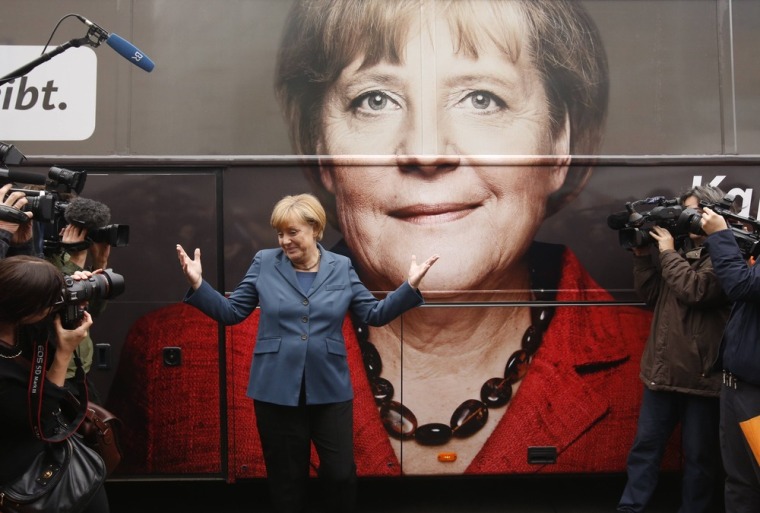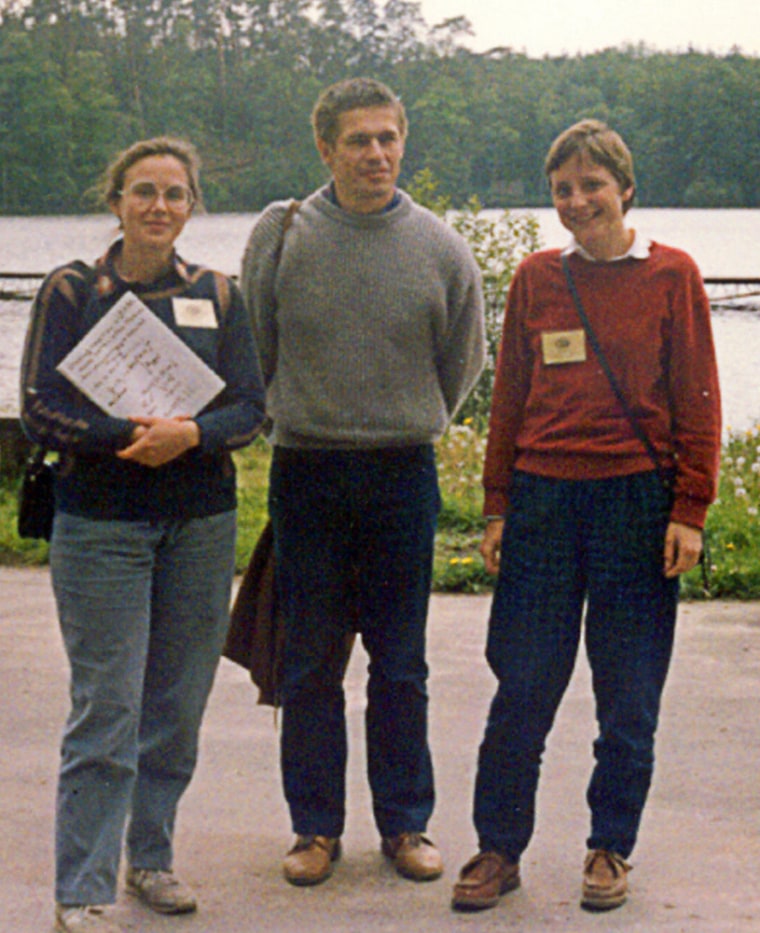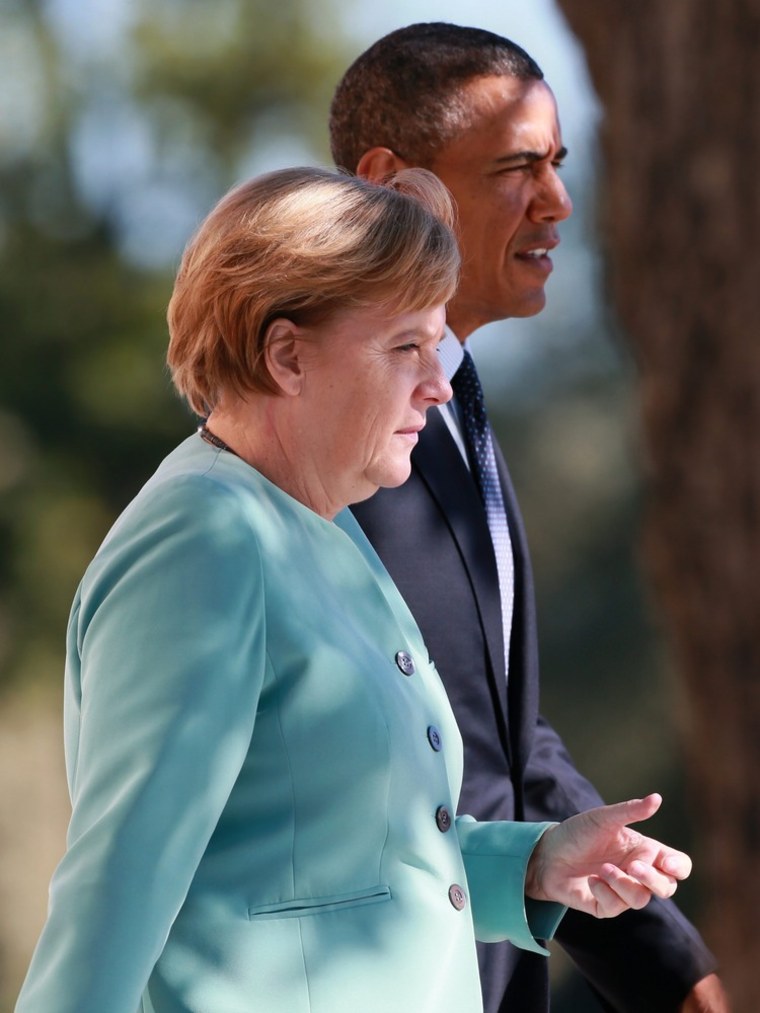
German Chancellor Angela Merkel may not be a household name in the U.S. but the conservative leader of Europe's largest economy is one of the most influential people in the world.
Forbes magazine put her in second place only after President Barack Obama on its World's Most Powerful People list this year – and in first place on its Most Powerful Women list. With a roughly 70 percent approval rating even after eight years in office, Germany's first female chancellor won a third term in Sunday's election.
So who is "Mutti" and why does she matter?
'No experiments'
Merkel, leader of the Christian Democrat party and center-right coalition government, is the first German chancellor to have grown up in East Germany. Some see her practical, cautious approach to governing as a reflection of an austere childhood on the "other" side of the Berlin Wall.
Her bland demeanor has earned her the nickname of "Mutti" or Mommy – both a compliment and a jibe: the mother of a nation, but too safe for some.
She has an unusual background for a politician, with a doctorate in quantum chemistry and no political career until the Berlin Wall fell in 1989. She rose quickly with the help of Chancellor Helmut Kohl – the oft-described architect of Germany's reunification.
Notoriously tight-lipped about her private life, Merkel, 59, is rarely even seen in public with her husband. A few revealing personal details do occasionally slip out, though, such as her account of standing on a diving board at school for an hour before working up the courage to jump.
"That's how I am, not particularly courageous," she said according to a report in The Telegraph newspaper. "I always need some time to weigh up the risks."
While her pragmatism and conservatism have won her many fans across Germany, critics slam her for lacking vision. However, Merkel appears to embrace it. Last week she rolled out the campaign slogan, "No experiments."

Political rise: 'Ruthless'
The influential Chancellor Kohl, who was known to call her "mein madchen," or my girl, became Merkel's mentor when he picked her to be in his cabinet despite her inexperience.
But the pair did not ride off into the sunset. Merkel turned on Kohl over a slush fund scandal and called for him to resign. She was elected to lead the Christian Democrats in 2000, and became chancellor in 2005 after her party formed a coalition with the center-left Social Democrats.
"[Merkel] would not be chancellor of Germany had she not been ruthless," said Judy Dempsey, European affairs expert at think tank Carnegie Europe and author of "Das Phanomen Merkel," a book on Merkel's chancellorship.
"It shows her political will and her energy and her absolute ambition to get to the top."
Economy: Step by step
Much of Merkel's power lies in the simple fact that she is head of Europe's powerhouse: Germany is almost single-handedly keeping the fragile Eurozone afloat. As with her even-keel political mentality, Merkel is similarly pragmatic in handling the debt crisis. She has consistently demanded that the floundering economies of Cyprus, Greece and Italy tighten their belts, believing those reforms will make Europe and the euro stronger and more competitive.
The reforms are no quick fix – but that's her style. The struggling residents of Southern Europe, meanwhile, characterize them as totalitarian and Nazi-like. Obama has even nudged her to ease up on austerity, fearing that a depressed Europe will threaten the U.S. economy, but she repeatedly rebuffs him, staying her course.
When talking recently about the uncertain fate of her coalition government come Sunday, she sounded more like she was explaining her step-by-step approach to Europe's ills. "I do not have fear," she said. "My task is to solve problems and to advance, even if it is only a few inches."
U.S. ties: A gradual thaw
"Merkel doesn't like flashy people," Dempsey said, referring to Merkel's less-than-chummy relationship with Obama. Her nature is to distrust – even her own advisers at times, it is rumored – so it took a while to warm up to the charismatic senator who drew a crowd of 200,000 in Berlin before he was even elected president. (Much was made of Obama not being allowed to speak at the Brandenburg Gate, but it was more because he wasn't a head of state and less a direct snub, it emerged later.)
Relations have gradually thawed, as the two leaders needed each other's support in handling the precarious global economy.

Obama invited Merkel to address a joint session of Congress in 2009 and awarded her the Presidential Medal of Freedom in 2011, an honor accompanied by a glamorous reception at the White House.
"The next time you come to Germany," Merkel reportedly told Obama that night, "you can speak at any gate you want." They now speak regularly.
Military: Aversion to war
Merkel's handling of security and military matters exemplifies her politically canny style. She has been perceptive to strong public opposition to military conflicts. "Merkel is completely ahead of the game on this," Dempsey said. "She knows what the public thinks. And she really doesn't like war. She really doesn't."
Although she supported the invasion of Iraq amid a big push to build up relations with the U.S., she eventually opposed it as Germans grew increasingly wary.
Afghanistan was but a whisper – she sent only 8,000 troops and was criticized by other coalition members for not pulling her weight. Reflecting public opinion at home, Merkel also opposed action in Libya and is continuing to push for diplomacy rather than force in Syria's bloody war.
NBC's Andy Eckardt and Carlo Angerer, CNBC's Annette Weisbach, The Associated Press and Reuters contributed to this report.
Related: